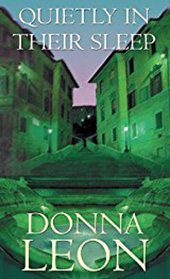Home »

I thank Donna Leon for this effort
Book Review
By Derryll White
Leon, Donna (1997). Quietly In Their Sleep.
 Perhaps the most important thing that Donna Leon reminds me of, each and every time I read her, is that we live in a world that is worth paying attention to. Commissioner Guido Brunetti knows Venice, Italy, intimately. He knows the stories behind the villa walls, and the realities behind the stories. He knows which flowers bloom where, and when, and has the sense to pay attention to them, smell them and get lost in the memory of their scent.
Perhaps the most important thing that Donna Leon reminds me of, each and every time I read her, is that we live in a world that is worth paying attention to. Commissioner Guido Brunetti knows Venice, Italy, intimately. He knows the stories behind the villa walls, and the realities behind the stories. He knows which flowers bloom where, and when, and has the sense to pay attention to them, smell them and get lost in the memory of their scent.
Leon also takes a hard look at religion in this novel, what it has manifested itself as in Italy, and how just that might be. Opus Dei is poked at, partially revealed as a secret Catholic society, and the reader is left wondering exactly what the real story might be and whether it might ever actually be revealed. It reminded me of the myths surrounding the Masons when I grew up – myths that were eventually revealed as self-serving masks for raw power.
“Quietly In Their Sleep” is an astonishingly strong novel which examines belief separate from religion, personal will separate from money and power. Amongst all the nastiness happening in today’s world Leon offers some hope for change powered by simple right-thinking people doing their duty as citizens of a better world.
Personally, I thank Donna Leon for this effort. It was an inspiring read.
****
Excerpts from the novel:
CRIME – He had also learned, during the years he had practised this profession of his, that the important trail to follow was the one left by money. The place where it began was usually a given: the person from whom the money was taken, either by force or by craft. The other end, where the trail finished, was the difficult one to find, just as it was the more vital one, for it was there that would also be found the person who had practised the craft or the force. Cui bono?
OLD AGE – At the end, they came into a large open room in which sat a handful of old people. Two or three were engaged in conversation that seemed to have grown desultory with long repetition. A half dozen sat on their chairs, looking off at memory, or perhaps regret.
GREED – Brunetti knew he was a man of many weaknesses: pride, indolence, and wrath, to name those he thought most evident, but he also knew that greed was not among them, and so, when confronted with its many manifestations, Brunetti always felt himself in the presence of an alien. He knew it was a common, perhaps the most common, vice, and he could certainly apprehend it with his mind, but it always failed to move his heart, and it left his spirit cold.
 – Derryll White once wrote books but now chooses to read and write about them. When not reading he writes history for the web at www.basininstitute.org.
– Derryll White once wrote books but now chooses to read and write about them. When not reading he writes history for the web at www.basininstitute.org.







